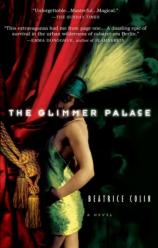The Glimmer Palace
Review
The Glimmer Palace
The city of Berlin has had a colorful and interesting history,
from its days as a Germanic tribal area to an industrial stronghold
and center of culture and arts in the modern era. The 20th century
saw Berlin achieve much but also suffer as governments toppled and
wars were fought. It remained, through it all, a cosmopolitan city
of romance and excitement. Novelist Beatrice Colin captures much of
this excitement and hardship as she chronicles the city from 1900
to the 1940s following one enigmatic character named Lilly Nelly
Aphrodite.
Lilly, the protagonist of THE GLIMMER PALACE, is born just as
the new century arrives. Though apparently lifeless at birth, she
gains strength and health and takes her all-important first breaths
as champagne corks are popped all around Berlin welcoming the year
1900. Her mother is an eccentric and beautiful actress and her
father a rich Bavarian who conceived her at the screening of an
early film. The new medium of film represents the new age of
Berlin, one of personal and artistic freedom. Her parents, however,
meet a tragic fate, and Lilly is raised in a Catholic orphanage by
the loving and austere Sister August.
From the day she is born until the end of this book, Lilly is
followed by heartbreak and loss, and her tale mirrors the violence
and confusion damaging the spirit and people of Berlin. A third
thread in the novel is the rise of the film industry. Each chapter
begins with a glimpse into film history and the new challenges it
was confronted with as the technology changed and the creators
faced an uncertain European social and political climate.
Lilly's life takes many interesting twists and turns as she
grows up and leaves the orphanage, is poor and starving in pre-war
Berlin, is rescued, courted, feted, abandoned, married, loved,
disappointed and eventually becomes a star of the silver screen.
Her story doesn't end there, however. As the second World War looms
large, Lilly, now known as Lidi, must choose between safety in
America and the love of her life in Berlin. To have them both is to
risk everything. Throughout, she is contrasted with her one friend
Hanne, who wants desperately the fame Lilly finds but instead ends
up meeting a sad and grisly end.
THE GLIMMER PALACE is mostly well written but dark and
depressing. Lilly and the other characters are never quite safe or
happy or healthy; violence, fear and pain haunt them at every point
in the tale. Colin is correct that the first half of the 20th
century was one of uncertainty and much worse in Germany, and the
nations' anxieties play out in her characters. Still, the overall
feeling is one of claustrophobic negativity: there are very few
bright moments for any of the characters here.
Lilly herself is a bit of a cipher. She is beautiful but vacant,
and passive --- that is, not an active agent in her own life until
it’s too late. It’s hard to understand what Colin
wanted readers to think about the seemingly cursed Lilly. But
intertwining her story with that of Berlin's redeems the book some,
and the city comes across as the real star of the novel.
Reviewed by Sarah Rachel Egelman on January 22, 2011
The Glimmer Palace
- Publication Date: July 7, 2009
- Genres: Fiction, Historical Fiction
- Paperback: 432 pages
- Publisher: Riverhead Trade
- ISBN-10: 1594483817
- ISBN-13: 9781594483813





